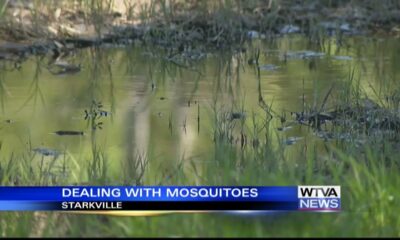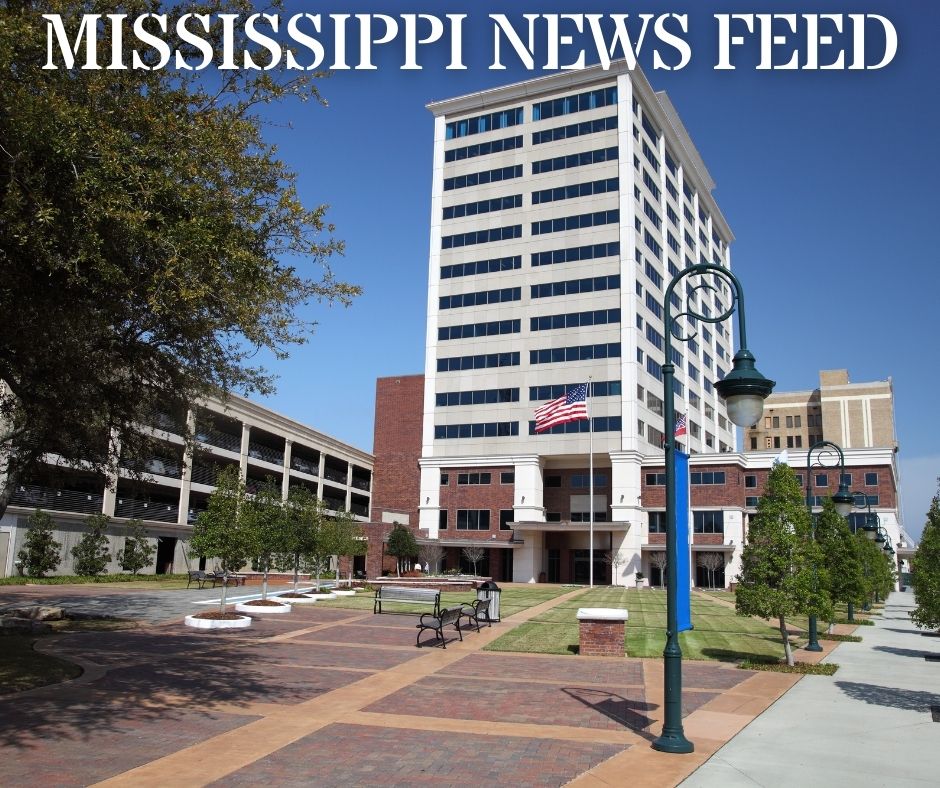Mississippi Today
Does Mississippi have any campaign finance rules? Legislative inaction, AG’s statements leave doubt
An attempt to reform Mississippi's lax, antiquated and jacked-up campaign finance laws went over like a lead balloon with lawmakers in this year's legislative session, with Republicans and Democrats alike gutting and deriding the reform bill before killing it.
So, that leaves the Magnolia State where it was, right? Weak laws. Little transparency for voters or enforcement for wrongdoers. Our government susceptible to the corrosive influence of secretive big-money special interests.
No. It's worse.
In her eleventh-hour hop onto the reform bandwagon, Attorney General Lynn Fitch, the state's top law officer, publicly opined, in writing, that she can't legally enforce the laws we do have. Oh, and that a $1,000 a year limit on out-of-state corporate donations to our politicians that everyone believed was law for at least the last 30 years is null and void under her new interpretation. She put that part of her press release in italics, for emphasis.
Fitch's last-minute joinder of calling for reform was seen as deflection of the flak she was receiving for not enforcing what many, including Lt. Gov. Delbert Hosemann, believed were flagrant violations of laws already on the books during last year's statewide elections. Millions of dollars in dark money poured into Mississippi campaigns and some candidates appeared to thumb their noses at what rules we do have.
Many chalked up Fitch's inaction on the complaints to not wanting to ruffle political feathers or sour relationships with potential donors for her own future political ambitions.
Despite Fitch lamenting, “We're allowing out-of-state influencers to determine and to pick who the candidates should be in our state … (and) We've got to have enforcement …,” a Mississippi Today analysis of her own campaign finance reports showed a majority of her campaign money came from out-of-state businesses: about $727,000 of $1.27 million.
Also, Fitch appears to receive lots of money from out-of-state interests to whom she awards AG office contracts. Records show she signed at least nine AG contracts last year with out-of-state law firms that had donated more than $300,000 to her campaign.
There has never been traction in the Mississippi Legislature for “pay-to-play” campaign donation prohibitions like other states have enacted.
Fitch, the only official with clear legal authority to investigate and enforce campaign finance violations, in her Feb. 6 press release appeared to throw in the towel on her office enforcing current laws: “Last year, we were asked to investigate several instances of clearly unethical and immoral campaign behavior. But we discovered they were not criminal under our current laws.”
So, what now?
Secretary of State Michael Watson helped lead the push for reform along with Hosemann and Senate Elections Chairman Jeremy England, R-Vancleave. The three have vowed to continue that push next legislative session.
In the meantime, Watson said he will continue to forward suspected violations to the AG's office, as the law prescribes. And, he said, he will continue to tell candidates there is (note the italics) a $1,000 a year limit on donations from both in-state and out-of-state corporations. He said this limit will remain in the written campaign finance guide the secretary of state's office has provided candidates for decades.
It's noteworthy that despite her Feb. 6 interpretation that no such limit applies to out-of-state corporations, Fitch appeared to think it did in August of 2023. After months of inaction on major campaign finance complaints, she announced then that she would investigate whether a PAC run by unsuccessful lieutenant governor candidate Chris McDaniel's campaign treasurer tried “exceeding corporate contribution limits” by shuffling out-of-state money through PACs.
“We are going to continue along the lines we have practiced for years and years,” Watson said. “… And, we are not going to stop, we are going to keep pushing for campaign finance reform.
“I don't have prosecutorial authority,” Watson said. “I can't prosecute so I have to have a willing and able attorney general working with me.”
Watson could hand off suspected campaign finance violations to local district attorneys. But Watson's office said that DAs typically would refer such misdemeanors down to county prosecutors, who don't have the resources to investigate or prosecute such violations. Plus, such complaints are often about districtwide or statewide candidates, often running in areas that extend beyond the jurisdiction of a county prosecutor or DA.
Watson said he believes current statute and definitions and decades of practice uphold the $1,000 limit and that other campaign finance laws — while in need of an overhaul — could still be enforced by the AG. But he did question her comments early this year.
“That was an interesting statement on her behalf, perhaps to dodge a little,” Watson said. “… If folks rely on her position, I do think it opens the door for outside dollars to flow in.”
Lawmakers have not only been loath to strengthen campaign finance laws and increase penalties, they've not wanted to provide offices such as the secretary of state or the Ethics Commission clear duties on collecting finance and other reports and enforcing deadlines. Such laws have been piecemealed and tweaked over many years in the name of reform, but now they often conflict, with one part of statute giving Ethics a responsibility, another saying the same responsibility belongs to the secretary of state's office.
Watson has said he's not not seeking more power for his office, but last year said, “… when people do not do their jobs, I will stand in the gap for Mississippians,” which appeared to be a dig at Fitch and a call for someone to be responsible for campaign finance enforcement.
Also, lawmakers have shown they not only don't want stronger campaign finance rules and enforcement, they don't want the citizenry to even be able to clearly see who donates to candidates and how much.
Most other states, including all those surrounding Mississippi, have searchable campaign finance databases. One can, for instance, type in the name of a donor and see all the campaigns to which the person donated and how much.
Setting up such data would not require Mississippi candidates learn any real computer skills — they could simply type in donation information into fields in a form on the secretary of state's website.
But lawmakers have shot down any effort to require such electronic campaign finance reports, including this year when Watson pitched it as part of his proposed reforms. Instead, Mississippi politicians can still file paper reports and hand-write them, which many still do with varying degrees of legibility. While Watson's office puts reports online, they are PDFs — pictures of pages that a citizen would have to go through page by page to tally donations. Cross referencing donors across all campaigns or even inspection to make sure the reports were filled out properly would be a daunting task.
While lawmakers shot down England's reform bill, with many voicing dismay at the inclusion of an online campaign finance filing requirement, the Legislature did approve $3.9 million for an overhaul of the secretary of state's computer system. Watson said he believes he can still move forward on developing such a filing system, although he said he would still require legislative approval to make electronic filing mandatory.
“The (request for proposals) for that system is going out in June, and it will have a platform for online campaign finance reporting,” Watson said. “… I think we will get there eventually. I think we can educate (lawmakers) on how simple it will be to use.”
Watson said he knows campaign finance reform and strengthening laws and penalties is a tough sell in the Legislature, but he believes change will come eventually. He noted that despite England's bill being shot down, “There were a large number of legislators who commented it was the right thing to do.”
He said eventually, campaign finance authority should be centralized, even if it's not under his office.
“I have no problem with that whatsoever,” Watson said recently. “That's what we told the Legislature — just centralize campaign finance under one roof. Mississippians deserve it. I don't want more authority, but I want the law to be followed.”
This article first appeared on Mississippi Today and is republished here under a Creative Commons license.
Mississippi Today
As heat rises, inmates and staff swelter in Mississippi’s prisons
As of Friday, five of the six locations where Mississippi's prisons are located are under a National Weather Service heat advisory.
And the Mississippi Department of Corrections has no clear timeline as to when it will install air conditioning to bring relief to inmates and staff.
“We are continuing to explore our options to provide air conditioning where possible; however, there is no timetable for that installation at this time,” MDOC spokesperson Kate Head wrote in an email.
One woman incarcerated at the women's prison at the Central Mississippi Correctional Facility in Pearl said relief from the heat is hard to come by and the temperatures inside are worse than outside without any shade or trees. The woman asked not to be named for fear of retaliation.
“It's actually worse (in) here,” she said Tuesday. “The heat just hits you in the face.”
The heat index, also known as what temperature feels like on the body, takes into account humidity and air temperature. Friday's advisory was said to expect index temperatures up to 110.
According to the Centers for Disease Control and Prevention, people who are at an increased risk of heat-related illnesses include those without access to air conditioning, those over the age of 65 and people with chronic conditions – populations that include incarcerated people.
Last year was the incarcerated woman's first summer at the prison, and she witnessed people pass out or experience seizures because of the heat.
Head, the MDOC spokesperson, wrote in an email that the department is taking steps to mitigate the heat by providing incarcerated people with water, ice and fans.

This is similar to what has been done in previous years, but some incarcerated people have said that distribution of ice isn't always regular or enough to support hundreds of people and that fans move hot air around. MDOC did not respond to these concerns Friday.
Air conditioning installation has been completed at the women's prison at CMCF in the church, school and dining areas, the incarcerated woman said. Several weeks ago it was completed in her housing zone, she said, but the AC there has not been turned on.
Tuesday evening, the prison superintendent visited the building where the incarcerated woman lives and told residents the air conditioning would not be turned on for the foreseeable future because it requires a part that is on backorder, the woman said.
The woman has also seen how three emotional support dogs trained by seminary students are moved to air conditioned areas and provided pools of water to stay cool. She doesn't understand how the animals get access to the relief but she and the other women don't.

“We get the short end of the stick on everything,” she said, in reference to how the men at CMCF already have AC and the dogs in the women's prison get access to it.
MDOC did not respond to questions about the air conditioning and the dogs' access to it.
Last year as air conditioning was installed at three-fourths of the Mississippi State Penitentiary at Parchman, Commissioner Burl Cain estimated that by sometime in 2025, AC would be coming Parchman's Unit 29, South Mississippi Correctional Institute in Leakesville and other facilities, so long as funding was available to support those upgrades.
“It just takes a good while to get it all done,” he said in an April 2023 interview with Missisisppi Today. “That's just the way the funding is.”
At Parchman, the heat index was above 130 degrees – within the extreme danger category where a person's risk of heat-related illness is likely – for 25 of the past 72 hours, according to the National Weather Service records.
On four separate instances Wednesday afternoon, the heat index reached 185 at Parchman, according to weather data.
Pictures from Parchman's Unit 29, which doesn't have air conditioning, shows how men have secured 8-inch fans purchased from the commissary to the bars of their cells and placed their mattress on the floor beneath the fan, which some have told advocates is how they get relief from the heat.
The majority of Parchman has had air conditioning since last summer, but Unit 29 is part of the group of prisons that are expected to get AC sometime in the future.
At all prisons, an 8-inch fan is available to buy from the commissary for $29.95, which is among one of the most expensive on the prison's commissary list compiled by The Appeal.
Even if an incarcerated person has a job, Mississippi prison industry jobs can pay between 20 cents and $1.30 an hour, which falls within an estimated national average calculated by the Prison Policy Initiative. The group also estimated regular prison jobs nationwide have an estimated range of 14 cents and 63 cents an hour.
Privately operated Eastern Mississippi Correctional Facility has AC including in its housing units, but family members told advocates that since the end of May, the air conditioning has not been functional.
The maximum daily temperatures in Meridian, where the prison is located, have been above 90 degrees since the end of May, according to the National Weather Service.
Meridian is also under a heat advisory, and within the past three days, the highest heat index was 107 degrees – 95 degrees at 75% humidity, which is in the danger category for heat-related illnesses.
Management and Training Corp. spokesperson Emily Lawhead said technicians have diagnosed problems with air conditioning units and will install new units when they arrive.
“We're working hard to get all AC units back online as soon as possible,” she wrote in an email.
In the meantime, Lawson said cold water and fans are available, and Gatorade is provided to staff and incarcerated people for them to stay hydrated. Swamp coolers are cooling the air in areas where AC units are waiting to be repaired, she said Friday.
Heat in prison is a national issue that Families Against Mandatory Minimums, which represents incarcerated people and their families, and One Voice United, a group representing corrections staff, have teamed up to address.
The Safer Prisons, Safer Communities campaign is highlighting a nationwide crisis through overcrowding, understaffing and deteriorating conditions that make prisons unconducive to rehabilitation and create poor conditions for incarcerated people, prison staff, families and communities.
Andy Potter, executive director of One Voice United and a former Michigan corrections officer, recognizes prison infrastructure can be old and it can be expensive to install air conditioning.
But he said it's not enough for incarcerated people and the corrections staff to rely on fans, water bottles and Gatorade to stay cool. The incarcerated and staff do not have the freedom or ability to seek relief in a similar way as those not in a prison system can do, Potter said.
Daniel Landsman, vice president of policy for FAMM, said air conditioning can help decrease incidents of violence and fatalities, which research has found increases with heat.
“Heat is just going to make all the things we are experiencing in our prison system worse,” he said.
This article first appeared on Mississippi Today and is republished here under a Creative Commons license.
Mississippi Today
On this day in 1827


JULY 5, 1827

A day after those enslaved were freed in the state of New York, 4,000 Black Americans marched along Broadway through downtown streets with a grand marshal carrying a drawn sword. They arrived at the African Zion Church, where abolitionist leader William Hamilton said, “This day we stand redeemed from a bitter thralldom.”
Celebrations took place as far away as Boston and Philadelphia. In New York's capital, Nathaniel Paul, pastor of the First African Baptist Society, declared, “We look forward … (to) when this foul stain will be entirely erased, and this, the worst of evils, will be forever done away … God who has made of one blood all nations of men, and who is said to be no respecter of persons, has so decreed; I therefore have no hesitation in declaring this sacred place, that not only throughout the United States of America, but throughout every part of the habitable world where slavery exists, it will be abolished.”
Among those freed by this act? Sojourner Truth, who was born into slavery and had escaped to freedom just a year earlier. The Fifth of July is still recognized and celebrated in New York City.
This article first appeared on Mississippi Today and is republished here under a Creative Commons license.
Did you miss our previous article…
https://www.biloxinewsevents.com/?p=372793
Mississippi Today
Salaries for two public university presidents creep toward $1 million a year
Two public university presidents in Mississippi now make almost $1 million a year each while pay for faculty and staff at the state's eight universities remains stagnant.
The hefty salaries are largely, but not entirely, due to the private foundations for the University of Mississippi and Mississippi State University supplementing the state salaries for Glenn Boyce and Mark Keenum, respectively.
Both presidents now pull $950,000 a year, with taxpayers supporting $500,000 of their salaries and the foundations making up the rest, according to IHL board meeting minutes.
That constitutes a $100,000 raise, which Keenum and Boyce received after the Institutions of Higher Learning Board of Trustees conducted performance reviews for the two presidents at the end of last year, John Sewell, a spokesperson, wrote in an email.
“University presidents play a critical role not only at their respective institutions but across the state,” Sewell wrote, “as Mississippi's public university system is poised to have an $8 billion impact on Mississippi's economy over the next six years.”
The board also reviewed Nora Miller, the president of Mississippi University for Women, but Miller did not receive a raise, and it's unclear if she requested one. Miller will continue to make $300,000, plus a $5,000 foundation supplement, in her new four-year contract.
When Miller was hired in 2018, the state paid her $215,000, and she received a $30,000 foundation supplement, according to IHL board records. In 2022, the board gave every college president a raise and reduced the foundation supplements to $5,000 for every university but Ole Miss and Mississippi State.
Last month, the board also approved significant “retention” plans for Boyce and Keenum, a kind of bonus paid for by the university foundations that no other college president in Mississippi receives. Keenum has an opportunity to get up to $1.4 million from the MSU foundation if he stays at Mississippi State through the end of his contract in 2028, and Boyce can receive up to $800,000 from the one at Ole Miss.
It is unclear if either president is planning to retire or leave their universities. While Mississippi taxpayers pay the university presidents significant sums of money, the board considers its salary decisions confidential.
Sewell declined to answer further questions about the purpose of the plans, writing that “information about specific evaluations and salary decisions are personnel matters and are considered confidential.”
A document obtained by Mississippi Today last year shows the criteria the board used to evaluate the eight college presidents as of January 2023, including “provides effective leadership in enrollment management,” “supports initiatives and programs that promote student retention” and “provides effective leadership in acquiring and sustaining regional and professional accreditations.”
Under Keenum, the National Science Foundation has ranked Mississippi State as a top research institution. Boyce's “Now and Ever” campaign has raised more than $1.5 billion in private support for Ole Miss.
“I am most grateful to the IHL trustees, Commissioner Rankins, and our university foundation board members for their vote of confidence in my leadership,” Boyce said in a statement. “More importantly, I am mindful that our university is thriving because of the unending commitment of our faculty and staff to deliver on our mission of education, research, service and healthcare each and every day.”
The IHL board first approved retention pay for Boyce in 2022. When the board granted Keenum that opportunity in 2021, he asked the Mississippi State University Foundation to “use a majority—if not all—of this incentive for scholarships.”
Sid Salter, an MSU spokesperson, declined to answer questions about whether the foundation used Keenum's retention pay for scholarships.
“The portions of those compensation packages that may rely on private MSU Foundation funds are not required to be disclosed beyond what the College Board has already provided,” Salter wrote. “The university has no additional comment.”
The IHL board also released its legislative priorities for the next year, including increasing pay for faculty and staff who make less than average compared to their peers at other Southern universities.
Since 2016, the average faculty member in Mississippi has actually seen a nearly $11,000 pay cut due to inflation, according to an analysis of federal data. In fall 2022, the average faculty salary in Mississippi was $68,676.
Though IHL has obtained nominal wage increases for faculty and staff, inflation and health insurance premium increases have put meaningful raises out of reach, the board has said.
READ MORE: ‘USM's new president making $650,000; all public college presidents saw raises this year'
This article first appeared on Mississippi Today and is republished here under a Creative Commons license.
-
Mississippi News17 hours ago
Two inmates escape from Mississippi detention center
-
Our Mississippi Home6 days ago
Recipes to Get You Ready for July 4th
-
Our Mississippi Home6 days ago
Marine Fisheries Internships Pave Way for Future USM Scientists
-
Local News5 days ago
Hurricane Beryl strengthens into a Category 4 storm as it nears the southeast Caribbean
-
Local News5 days ago
Mississippi sets new laws on Medicaid during pregnancy, school funding, inheritance and alcohol
-
Local News6 days ago
IRS announces tax relief for taxpayers impacted by severe storms, straight-line winds, tornadoes, and flooding in Mississippi
-
Mississippi News2 days ago
Case hits close to home in Columbus
-
Local News7 days ago
Diamondhead launches new “community read” program




































